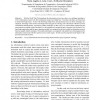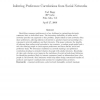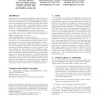299 search results - page 28 / 60 » Disambiguation of People in Web Search Using a Knowledge Bas... |
ICTAI
2008
IEEE
14 years 3 months ago
2008
IEEE
– With the World Wide Web popularity the information retrieval area has a new challenge intending to retrieve information resources by their meaning by using a knowledge base. No...
ECRA
2010
13 years 9 months ago
2010
Identifying consumer preferences is a key challenge in customizing electronic commerce sites to individual users. The increasing availability of online social networks provides on...
BMCBI
2007
13 years 8 months ago
2007
Motivation: With more and more research dedicated to literature mining in the biomedical domain, more and more systems are available for people to choose from when building litera...
CIKM
2005
Springer
14 years 2 months ago
2005
Springer
Depending on a web searcher’s familiarity with a query’s target topic, it may be more appropriate to show her introductory or advanced documents. The TREC HARD [1] track defi...
WWW
2007
ACM
14 years 9 months ago
2007
ACM
Determining the user intent of Web searches is a difficult problem due to the sparse data available concerning the searcher. In this paper, we examine a method to determine the us...



